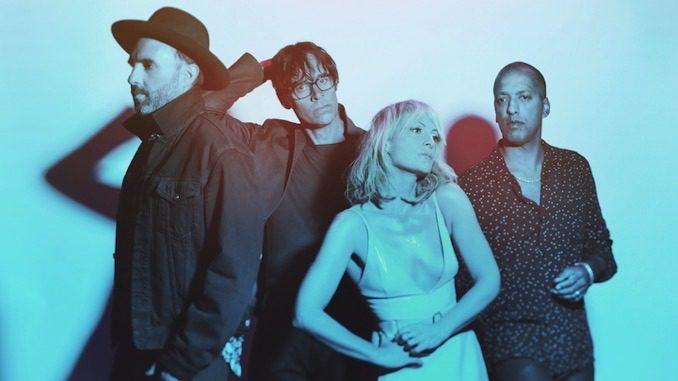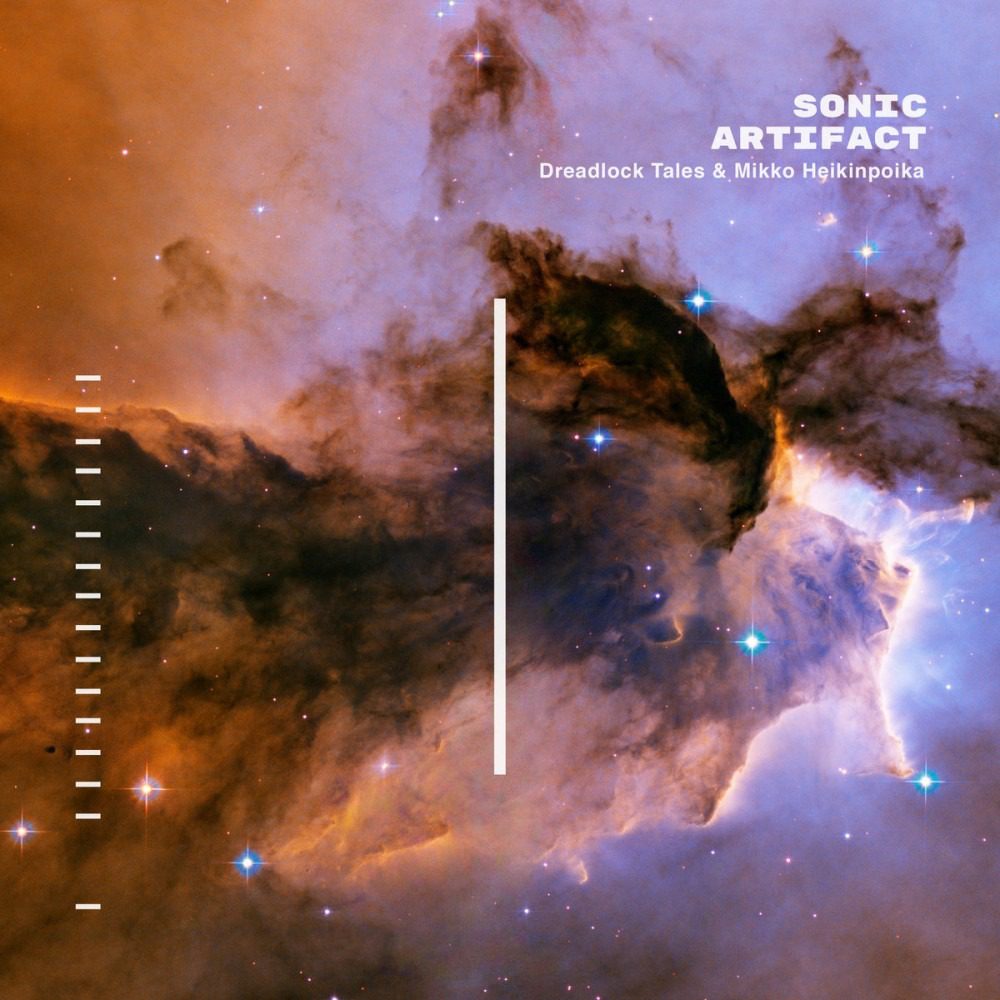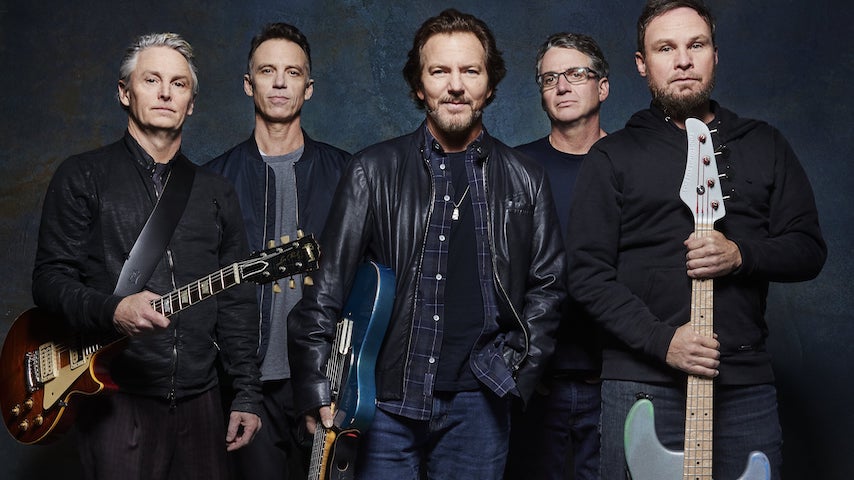Emily Haines has had many opportunities to expand her musical palette over the years. Born in New Delhi, where her mother ran a school for at-risk Indian children, she grew up under the adventurous auspices of her Canadian poet father Paul Haines, renowned for sonic experiments like Elevator Over the Hill, a late-‘60s jazz-opera collaboration with Carla Bley, for which he penned the libretto. She also drew inspiration from studying drama in college, where she met two musicians who would play key roles in her life, Amy Millan and Kevin Drew, with whom she still collaborates in the band Broken Social Scene. Meeting guitarist Jimmy Shaw in their native Toronto ’97 would prove even more influential for this keyboardist/vocalist—after testing the nightclub-performance waters as the duo Mainstream, they changed their moniker to Metric, added members Joshua Winstead on bass and Joules Scott-Key on drums, and began exploring the junctures where pop, dance, electronica and retro-playful New Wave crossed aesthetic paths. Haines’ Blondie-pneumatic singing was often at odds with Shaw’s growling punk-metal guitars, which only added to her options, through seven Metric missives and more ethereal, piano-buttressed diversions on her own with Emily Haines & The Soft Skeleton.
The Canadian crooner probably thought she had her sound polished to patented perfection. But the pandemic had other ideas.
For Metric’s dark, but ruthlessly inventive new album, Formentera, their eighth, she didn’t make any attempts to lyrically gloss over the sense of ennui and existential dread that everyone had. She faced it, head-on, in its thumping opening processional, an ominous 10-and-a-half-minute epistle called “Doomscroller,” a sign of the sinister times if ever there was one. Given that “doomscrolling”—compulsively scanning online news for the worst headlines lockdown could offer—was one of the Oxford dictionary’s most popular new Words of the Year for 2020, vocalist/keyboardist Emily Haines doesn’t blanket the truth with sunny sophistry and instead implements subtle, repeated Sprechgesang observations like, “Was it an act of God or an accident?” and the chilly societal comparison, “Salt of the Earth, underpaid to serve you … Scum of the Earth overpaid to rob you.” Remember those early coronavirus days when we suddenly realized how much we relied on—and often took for granted—those blue-collar cogs inn the workplace machinery? And Shaw had just completed work on an intricate hometown studio, where Metric captured the Wagnerian spirit of this zeitgeist track, and others, like “All Comes Crashing,” “What Feels Like Eternity” and an elegiac, shimmering closer, “Paths in the Sky,” which attempts to “cure the blues that seemed to be destroying me.”
The title cut alone has multiple meanings. Formentera is actually a real exotic getaway, a Balearic island that the band stumbled across in a travel magazine. But it also came to symbolize an oasis, a haven, something to hope for once this pandemic finally passes (“I’ve got so far to go/ So give my soul some peace,” the vocals plead in the six-minute prog-tinged opus). “And doomscrolling? I think a lot of people have experienced that,” reckons Haines, a seasoned and remarkably confident 48. “And that isn’t going anywhere, that feeling of … of powerlessness. But it’s all within the scope of what you can control, and what you can have an impact on.” Something shifted for Haines in the process, and she now has honed her creative focus to an almost laser-like precision, Covid be damned. “I have one purpose, and that is to write these songs and sing them, and in doing so be reasonably useful,” she adds of her new Metric mission statement. “So I hope that’s the case with this new music, that it’s useful to people.” Haines checked in during a recent press week in Toronto to elaborate.
Paste: What hobbies kept your mind occupied during lockdown? A lot of folks got into gardening, some got into jigsaw puzzles …
Emily Haines: Yeah, I was just gonna say gardening really happened for me. I have this property that’s beautifully populated with trees, and I just kind of wander out there. There’s this whole big stretch called The Meadow, and it amazes me, every time I go out—something else is in bloom, every tree has an identity, and there’s that thing where a tree will look dead, but other saplings will be coming up around it. And I feel so blissed out. And then in the garden, similarly—I just cannot believe, after a Canadian winter, that things bloom. But they do.
Paste: And you’re outside of Toronto, right? Is there nature around?
Haines: Yeah. Yeah. It’s a beautiful area called the MOMA Hills, and I got a place that’s just rolling, beautiful, untouched forest and rivers. And I run from this dirt road, and then my neighbor has a pond that I can jump in—it’s fully Huckleberry Finn kind of bullshit, but I love it. And there are coyotes, which I’m not into because I have a dog. But I see this one thing, and I’m convinced it’s the same guy, this porcupine, which is a very cool creature. And I saw a fox recently, and I see deer quite commonly. There is one fawn which took up residence right by my front door, which I also thought was an amazing metaphor for the whole, like, just don’t do anything. Because you can be like, “Oh, my God! What do I do?” And you Google a million things, but it’s like, “Leave it alone. Let it do its thing. Nature is doing what it should do—you are not useful. ” So that’s a pretty stunning thing to see and witness.
Paste: So what was—and is—your daily ritual? Do you get outdoors immediately in the morning? Or wait until the afternoon?
Haines: Well, I’m pretty bad in the winter because the cold is tough, even though it is beautiful, more in the natural world than in the slush. But in the springtime, normally I take the dog out to The Meadow first thing in the morning, right after my run. I’ll have a nice run on that dirt road, and if it’s summertime, jump in the pond, if it isn’t, just come home, get the dog, go out to The Meadow with a coffee. And he’s a toy poodle named Romeo. Of course.
Paste: What if you have a song idea, forming in your head out there, like in Time Bandits? Do you carry a notepad to jot it down?
Haines: You mean out in The Meadow? I do actually keep them in my head, mostly, those thoughts. But I feel like the whole time I’m out there is like a meditation. And then at home, I have a piano on each floor—I don’t like to be more than a few feet away from an instrument. But I often find that it’s disruptive. I don’t know if it’s the same thing, being a writer, but for me, the ideas are very disruptive to my orderly existence. Like, I’ll be having a really pragmatic, put-together kind of day, taking care of things, gardening, you know, just being on it. And then something will strike, and the next thing I know, it’s like, “Fuck! Now I’m playing at the piano and I’m all hunched over, and it’s dark but I haven’t lit the fire, and the dog isn’t fed. You know? It’s disruptive. But I do feel that when things come to me, I owe it to the Muse to pay attention.
Paste: A lot of great songwriters over the years have agreed that on a clear night, if you have your antennae up, the song almost beams down to you from the universe, pre-written.
Haines: Yeah, that’s right. And that actually just happened. I came to the city because this whole week is press and listenings and everything, and we released “Eternity” today, so there was a lot going on. But I just had this really great week, where I felt like a very put-together person, taking care of things. And then it was exactly what you’re describing—I was like, “Oh, no!” The antennae went up, and that’s exactly what happened. I found myself tied to the piano, and then the next thing I knew, it was like the middle of the night, and then the next day, I was really off-kilter because I was just fixating on certain words. Because it’s that thing where, even if it’s beaming down, you’ve got to pay attention and get it into some sort of shape, even if it seems clear. For me, at least, I can’t walk away too soon—I’ve got to build like a bit of a structure. So yeah, it was inconvenient. Stupid song!
Paste: Looking back on it, what lightning did you capture in a bottle with it?
Haines: Well, we’re working on another record, of course. Always. But it’s this idea of the impossibility that it could be you that achieves something great. Like, someone is gonna do it. And it won’t be you, but it could be you, or it could be you, but it won’t be you—it’s like playing around with those huge permutations and kind of riffing on the idea of—and this isn’t expressed, lyrically—but you know how they found the Shackleton boat recently? Like, unbelievably, they found it, and it’s astonishing. But I played this benefit for the International Center of Photography in New York, and it was honoring all these incredible photographers, obviously, who’ve worked in the natural world. And one of them is this woman who just had this calling to go to the Arctic to learn her craft as a photographer in this really harsh environment. And she’s the person who took the picture of the discovered Shackleton boat. And I was just so struck by that, that somebody had to take that picture, and it’s her. It’s not somebody else—it’s her. So that’s sort of a through line in there. And she was ambitious, certainly, to develop that skill. But in my dream, she was the right person, she was there, and she got that shot. It’s so cool.
Paste: It’s interesting to note that there are few global frontiers like that left to explore, and even the chance of your boat being frozen solid for the winter is evaporating with global warming. And you no longer have to conquer some natural barrier simply “because it’s there,” (as English climber George Mallory said to justify his repeated attempts to scale Mt. Everest back in the 1920s).
Haines: Yeah, I really get where you’re coming from as an assessment of the state of things. Like, the idea that the explorations are increasingly solipsistic, self-centered and obsessive as we carve out our attention span and sell the personal, or whatever we can harvest from our cannibalized lives. But I do think on a more literal level, the Arctic is a place where people are still finding things. And maybe the depths of the ocean, in general. I was just reading something where they found crazy-ass new undersea species that nobody could imagine. And I actually saw that there were new creatures being discovered on those floating plastic hellscapes, which is the kind of thing that I love—humanity can do its worst, but the idea, and it’s a bit of magical thinking or hoping, that the natural world will evolve to benefit from that. So your insight is kind of sad, but I agree that that’s the state of things.
Paste: So did you find most of your pandemic solace outside, relaxing? Or inside, actually creating?
Haines: I don’t know, man. It feels weird trying to look back at something that we’re still weirdly in, but we’re all like, “Yay! It’s over!” And everyone’s like, “Okay … ” Something’s over. I mean, I was in the studio as much as possible in the winter months. And the studio Jimmy’s built? Honestly, the skill that these guy have—I don’t fucking understand how they know, with all the insane amount of cabling and just building the drum room. But we were able to make the entire album there, other than the Budapest Art Orchestra, which we recorded in a live conference, where the conductor was in one city and they were in Budapest. But you know, I found solace in the natural world, for sure, because the city was really grim and frightening. So I was in nature as much as I could be, and then I did feel, though, like I was getting squirrelly as hell, so going back to New York was a real kind of key reset. I went back for Hal Willner’s funeral, which was two year after, because he passed away from Covid the same day as John Prine during the pandemic. And I have such a long relationship with the city, and he and Lou [Reed] were the keys to my adult life in New York, and my creative life. And now they’re both dead. But it felt really good to be back in New York, because New York will always bounce back.
Paste: Lou Reed always stressed the importance of curiosity as an artistic motivating factor.
Haines: Yeah. Because without it, I mean … what’s the drive? Right?
Paste: The album opens with a 10-minute track dubbed “Doomscroller.” Did you find yourself, like many people, compulsively doomscrolling during lockdown?
Haines: I mean, yeah. And I think the song speaks for itself as far as the depth. And the term is sort of funny, maybe. But the affliction is real. And I’m so pleased that that music is now out in the world, because the response that it got? I think it validates for a lot of people this sense that … you know, there was a time when raising awareness was what we needed to do—every time you turned around, it was “Raising awareness! More awareness!” But I feel like now, the awareness has absolutely peaked, for people who are compassionate, and people who care about other people and what’s happening in the world. And we are absolutely at the end of what we can handle, in terms of anxiety and misery and hopelessness and helplessness, to be of any use. And you look at the shootings, and they’re lining up all the numbers under the names, and it could be anything, right? There are so many horrors that this could be related to, tragically. But I really feel that I personally hit a point where my level of anxiety and sadness and hopelessness of feeling so completely fucking useless to do anything really was at an unsustainable point, which is very much what this record ended up being about. Formentera? I needed to make that place, that escape, because you can’t function when you’re so seized up with that sense of hopelessness.
Paste: Because Formentera started as an island, but it became a much bigger metaphor.
Haines: Yes. But kind of like the film Brazil, I suppose. It’s an actual place, but it’s also a place that he goes in his mind.
Paste: Correct me if I’m wrong. You actually have a David Cronenberg connection?
Haines: Yes. We scored Cosmopolis with Howard Shore, who I actually just saw again recently in New York. And I haven’t seen his new one, Crimes of the Future, but I can’t wait. I think it should be pretty good. But we’ve been really fortunate. A lot of the work we’ve done has just sort of come to us, and we just try to fulfill it. And I was really pleased with that opportunity, because that book is really good, the Don Delillo book of the same name, Cosmopolis. It’s really ambitious. And the music is super-disturbing.
Paste: What’s the biggest lesson you learned from the pandemic, that’s made you a better person today?
Haines: That the scope of my control is incredibly minuscule. And the only way for me to be effective in this world and contribute anything is to come to terms with that—my insignificance—and work from there.
Listen to Metric’s 2010 Daytrotter session below.




